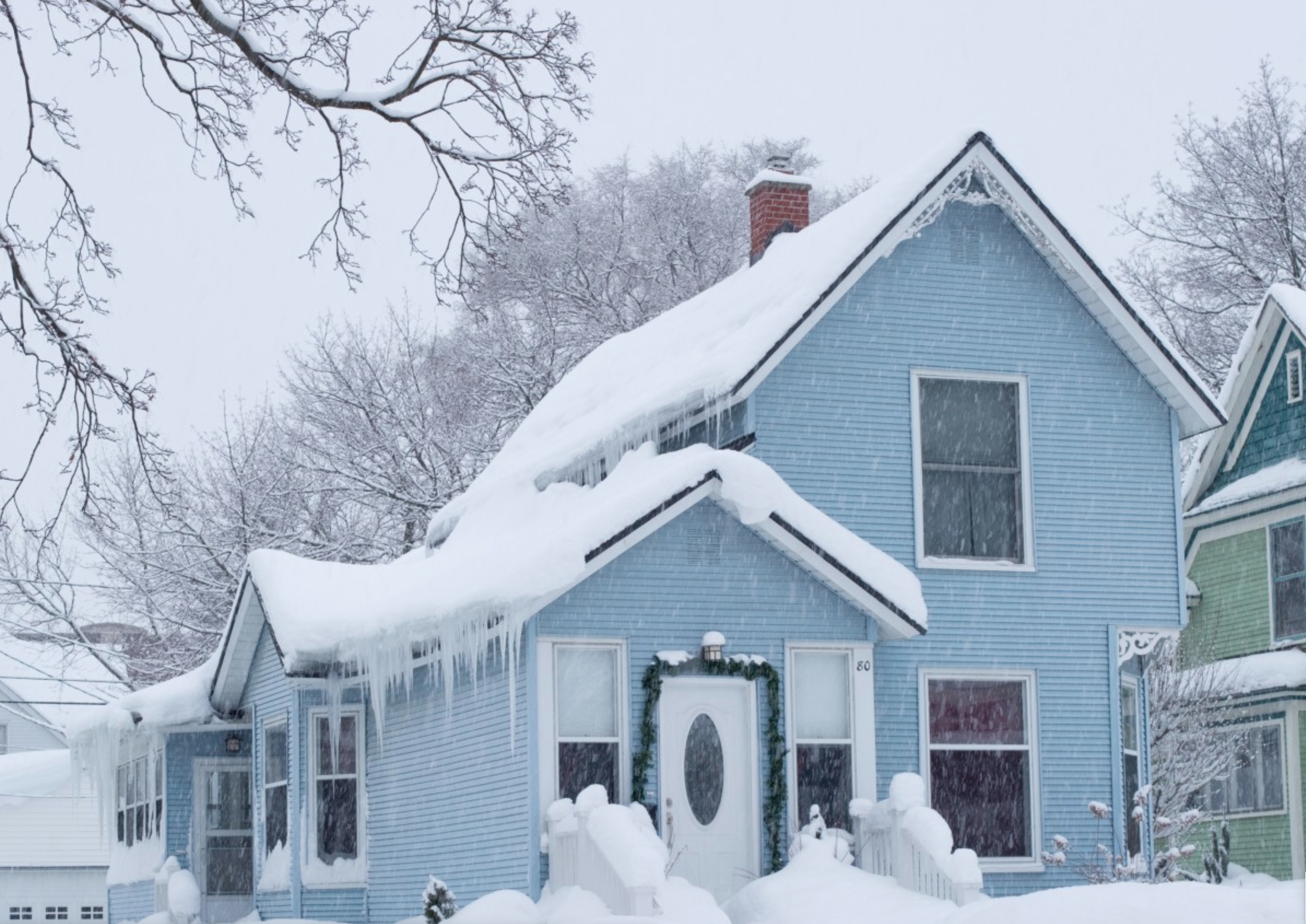
The best roofing material for cold climates has to stand up to the pressures of heavy snow and ice, strong winds, and freeze/thaw cycles. It should also have insulative properties that keep your home warm, lower your energy bills, and minimize ice build-up on the roof. The best roofing material for snow will insulate your home and protect your roof and home from structural damage resulting from a significant winter event. Let's take a closer look at some potential threats snow presents to your roof.
The Threats of Snow Damage
Snow damage to your roof due to weight, water, and ice can lead to detrimental and expensive roofing and structural damage, primarily due to roof collapse from snow, wood rot, and mold.
Weight
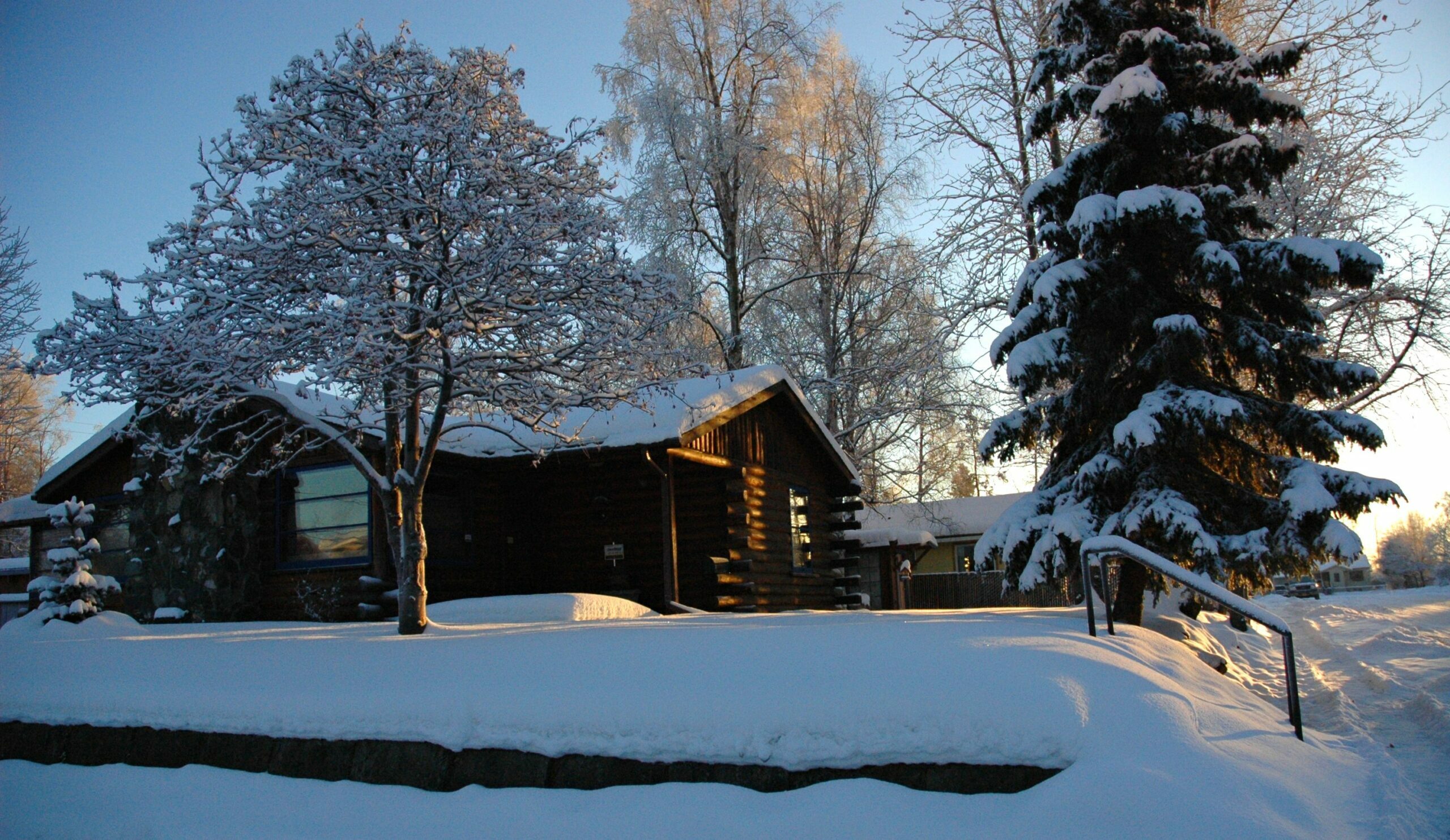
The excessive weight of heavy wet snow, large drifts of lighter snow, and ice can exert significant pressure on your house and put the roof at risk of collapsing — leading to expensive property damage and potentially fatal injuries. Along with the weight of snow, weak roofing materials, poor construction, and inadequate roof drainage can further lead to an over-stressed roof. The warning signs of a collapsing roof include difficulty opening and closing windows and doors, sagging ceilings, and creaking noises. If you suspect your roof is collapsing, you need to take immediate action and call a roofing professional. To prevent roof collapse and costly repairs, the best roof for snow should have the strength and resilience to withstand heavy snow and ice.
Water Damage
Melting snow can seep through even the tiniest cracks in your roof, causing water damage to your attic space. Moisture can make your wood frame, rafters, roof sheathing, and attic insulation vulnerable to mold and rot. Eventually, your roof will sag and leak, and your family could develop respiratory problems. You can minimize water damage to your home from melting snow leaking into the attic by choosing a durable-insulated roofing material that resists cracking.
Ice Buildup
Water damage to your home's interior structure may occur during the snowy-winter months by the formation of ice dams on the roof. Ice dams can cause your roof tiles to leak into your attic ceiling. Moisture leakage can damage your drywall and insulation and threaten the structural integrity of your home. The moisture can also cause mold, which can endanger you and your family's health and well-being.
What are Ice Dams?
Heating your home during the winter will warm the roof and melt the accumulated snow. The melting snow flows down to the colder edges of the roof and refreezes into ice. If this repeatedly happens, an ice dam can occur, blocking and pooling melting snow which usually makes its way under your flashing and shingles. Unfortunately, once this occurs, many roofs will leak through cracks and joints in the roofing material. You can minimize the impact of an ice dam through adequate attic ventilation, proper insulation, and a durable roofing tile with a high R-value.
Benefits of a Cold Climate Roof
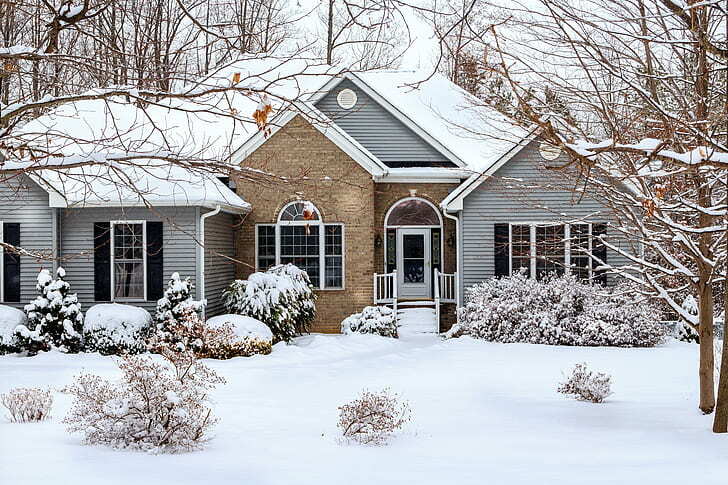
Quality roofing materials for cold climates will protect against the impact of cold-snowy weather. Good roofing tiles will also insulate your home to keep it warm and reduce your expenses during the long winter months. We have evaluated four snow-friendly roofing materials to help you make the best choice:
Fiberglass Asphalt
Fiberglass asphalt shingles are an affordable, readily available, and easy to install roofing option to protect your house against most winters. They help to insulate and retain heat in your home’s interior. Most fiberglass asphalt shingles come with a 20- to 30-year warranty. However, they require regular maintenance to ensure the integrity and strength of the roof. On the downside, fiberglass asphalt shingles have a shorter lifespan compared to other roofing products. They can only withstand winds of up to 135 mph. Fiberglass asphalt shingles may crack during harsh winter weather - requiring immediate repair to prevent damage to the home.
Metal
Lightweight and easy to install metal roofing makes snow and ice slide right off, deterring the accumulation of dangerous and destructive ice and snow. Metal-shake roofs, when properly installed, will protect a home from severe winds up to 140-miles per hour during a hazardous winter storm. Properly maintained metal roofs can last up to 40 years. A home with a metal roof in a cold-snowy climate will require additional insulation. Metal roofs have a zero R-value and do not stop heat transfer. Without extra insulation, the energy bill will significantly increase.
Slate
Durable slate roofing stands up to heavy snow and layers of ice during the harshest winters. Strong slate tiles have a potential lifespan of over 100 years. The density of slate makes it a substantial insulator, helping to keep your home warm and your heating bills low. It has a wind-resistant rating of 160 mph and can stand up to severe-winter winds. You will pay a high price for slate roofing. In addition to the high cost, its massive weight makes it difficult to install and will require additional structural support to your home.
Synthetic Tiles
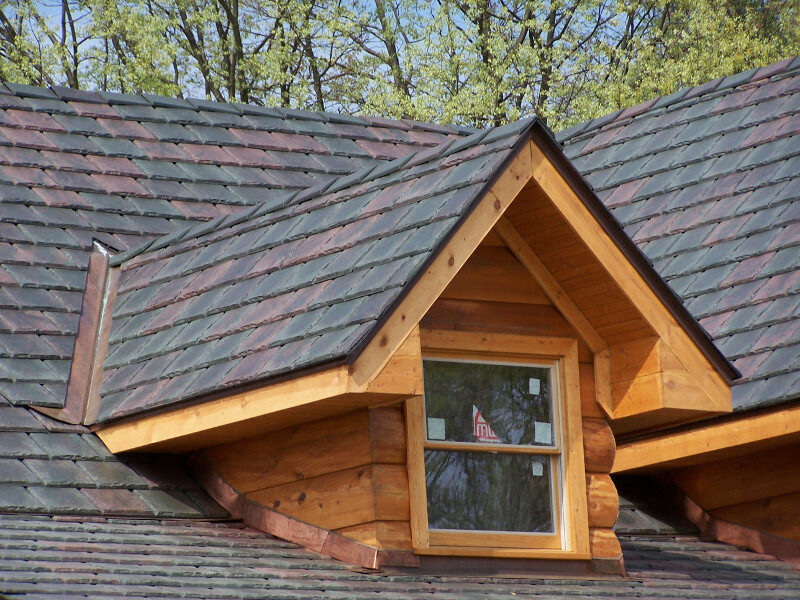
Beautiful and lightweight synthetic shingles mimic both wood and stone shingles. They offer a fourth (and best) option for roofing material in a snowy climate. Highly durable synthetic shingles have a Class 4 Impact Rating, the highest rating a product can receive. Synthetic roofing also stands up to winds of over 188 mph. They also resist freeze and thaw cycles and have an insulative value that contributes towards a home’s energy efficiency. All of these reasons make synthetic tiles the best roofing material for heavy snow and ice.
Brava Synthetic Tiles for Snowy Climates
Truly effective roofing material has to maintain its integrity against snow, ice, and wind without becoming compromised. It also works to insulate your home. Attractive synthetic shingles offer the perfect roof for snowy climates.
Advantages of synthetic tiles
In cold and snowy climates, synthetic tiles, like Brava’s roof tile products, provide several advantages: strength, durability, insulative value, low-maintenance, and temperature- and wind-resistance. Lightweight synthetic tiles are easy to install and don’t require extra structural support to the home, saving builders and homeowners lots of time and money.
3 Styles of Durable Tile
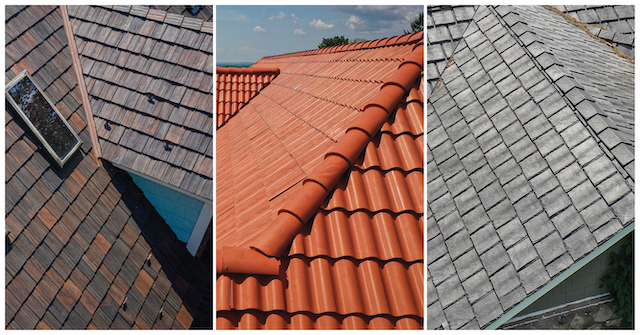
At Brava, we feature three distinctive composite tile styles to fit any architectural design. Our tiles achieve, if not exceed, the beauty of Spanish clay tile, natural slate, and cedar shake roofing. Our revolutionary multi-coloring process helps create authentic color variation and flow (in any custom color or combination throughout the tiles).
1. Shake
has a natural beauty and the rustic split textures of real cedar. They have a much longer life expectancy and require less maintenance and repair than natural wood shingles. Synthetic shakes provide a greater return on investment, fewer damage concerns, and a steadfast aesthetic appearance.
2. Slate
offers the beauty of quarried slate but with easier installation, no requirement of costly substructure modifications, and less maintenance than heavy-natural slate.
3. Barrel
Our composite Spanish Barrel tiles provide a superior alternative to barrel clay tiles. Lightweight barrel tiles from Brava eliminate the need for expensive structural support. Composite Spanish Barrel tile from Brava is the only 3rd-party tested and Miami-Dade County-approved synthetic tile on the market.
Choose Brava for Your Cold Weather Roof
Brava roofing tiles are the best roofing material for heavy snow. Our durable yet lightweight, composite roofing won't collapse under the weight of snow and ice. Our Class 4, impact-resistant shingles will not crack, tear, or split during a severe winter storm with winds up to 188+ mph with ring shank nails. Since our tiles maintain their integrity, moisture won't leak through the roof and damage your home. Our products maintain their integrity during freezing and thawing events. For these reasons, Brava roofing tiles are the best roof material for snow. Get Inspired - Click Here to Order Your Complimentary Lookbook.



